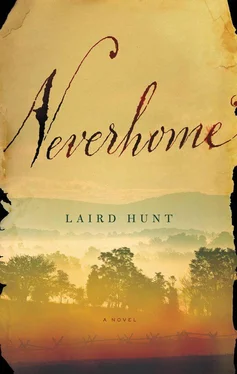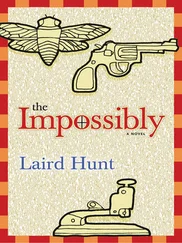“You’re holding that blade wrong, for one thing,” I said to the fellow playing at being a barber.
“How in fuck’s he supposed to hold it?” said the fellow had been cut.
I put down my bucket and came over and showed him how it was done.
“You stink like a sewer, little sister,” said the one I’d taken the blade from.
“He ain’t wrong,” said the other, “but you keep on.”
I shaved him, then shaved his friend, and every now and then after that I got called on to scrape a face. Mostly it was guards but twice or three times there was a prisoner in the mix. These were big-bearded things attached to some flaps of skin, some ruins of shoulders, some piles of bones. When I shaved them up there wasn’t anything left to them. You could of just dug at the dirt and kicked them straight into the hole. They were happy, though. Smiled and winked. Appeared these shaves were a kind of treat. Given out by the guards for good behavior. Maybe they were the ones didn’t scream. Some of them had been soldiers couldn’t stand the fight any longer. Boys that had run away from the bullets or been found back in camp having never left their bunks. One fellow I cleaned up had the wringing-hands problem. Didn’t stop him from smiling like it was Christmas morning when I got the hair off his face.
It wasn’t just jolly shaves in the yard for the men prisoners in that place, though. Coming and going from the yard you went by a chair set in a cell didn’t have any door. Sometimes there was a man strapped into that chair and sometimes there wasn’t. I walked by it once and a man was attached to it. You couldn’t see what he looked like because they pulled a kind of hat down over the eyes of the ones they had sit there. The hat looked like it was a slop bucket had a brim. He didn’t have any shirt on and you could see the shape of his ribs. Had the stove-in chest of a boy long been sickly, and a ugly cut hadn’t healed too well straight across his stomach. They had tied a gag on his mouth. Hadn’t handed him any flower to hold either.
You would have thought in that place they kept me for all those months straight through wintertime I would have done the bigger cut of my thinking about home and Bartholomew and that baby boy we had had for those cold minutes and my mother lying done with her shame in her bones beneath the ground, but the truth is I thought more about Neva Thatcher and the Colonel. That place and its ways must have stole into my head to haunt me because the two of them had come to form a kind of happy couple in my mind, Neva Thatcher with her chinaware and linden-berry mouth, the Colonel with his long whiskers and his smoke.
“Bring me Neva Thatcher,” I would tell the keeper, who would cuff me hard for it. “Bring the Colonel,” I would yell out to the doctor when he peeped in. They did not bring Neva Thatcher to me. But one February morning with the snow falling, my Colonel came.

They took me down to a room looked like it belonged to another building altogether. It had a green and yellow rug with dogs and diamonds on it and purple wallpaper with thin red stripes. They had a table with a glass vase full of dried flowers sitting in its center and there were two soft chairs. There was a fire crackling nice on one end. A guard stood at attention but the Colonel told him it was all right and he stepped outside. There was a little window in the room and you could see the snow fall past it. While I looked at the snow, the Colonel took up the glass vase of flowers and set it on the floor.
“Gallant Ash,” the Colonel said.
“Colonel, sir,” I said back.
He suggested we move the chairs closer to the fire and sit. I was in my thin dress and expect I had let my teeth clack when I spoke to him. When we had settled he told me that his regiment had been broken to bits and scattered. Some of what was left, including him, had been redeployed.
“How is your cousin?” I said.
“Past all care,” he said.
“I am sorry.”
“I appreciate it.”
He did not look grand and gray any longer. He looked old. Like the fist of years had found out his face and struck a sure blow. There was mud upon his boots. His nose gave a trickle. His coat had a long tear down one side.
“I’m no spy,” I said.
“I understand you give out shaves to the men here,” he replied.
“Did they tell you I get to carry out the slops too?”
“They did.”
We looked a little at each other.
“I’m told I’m to be made a general,” he said.
“I gave no secrets. I did my duty.”
“Do you know what I was before this war?”
I shook my head.
“Nor do I. I cannot remember. Or if I can, it seems like a life that belongs to some other and I do not credit it. There is a wife loves me and whom I love in that life. I expect that if I am not killed, I will remember it again someday.”
“I remember my home. I remember every inch and mile. I have a husband back home waiting for me.”
“Is he? Waiting for you, I mean?”
“Why wouldn’t he be?”
“I have heard it said you hail from the South. I don’t believe that. Not even for one Secesh minute. Your surprise lay elsewhere. Do you remember when we spoke of surprises?”
“I am no spy. Sir, I just wanted to fight. I just wanted to go away for a while.”
“That’s two different things.”
“It’s one thing.”
“Explain to me how it is one.”
“I’ll answer to just about any order you give me, but not that one.”
He looked at me. Long and hard.
“Because you won’t or because you can’t?”
“Both.”
“All right. Well, enough. Let’s leave off that. Leave epistemology be. Let’s return to our earlier line, which was ontological. Do you follow me?”
“No.”
“Epistemology concerns knowledge. Ontology concerns what we are.”
“Or what we aren’t.”
“Not a whore, we know that, and not a spy, we know that too; that leaves only lunacy for the cause. Or at least that is what the doctor here told me. He says you suffer from that ancient malady. You have been set adrift by the moon. You gallop among the stars.”
“I don’t answer to any sickness such as that.”
“I’m quoting your physician.”
“I just wanted to fight. To plant my foot and stand stalwart and never run.”
“But you did steal food and tobacco and sundry medical supplies out of the haversacks of active Federal combatants and so deprive men-at-arms, sometimes wounded men-at-arms.”
“I was a man-at-arms. Wounded for the cause.”
“You were a common thief.”
“I stole from no one.”
“It was a foul rumor, then. Nothing more. Of course it was. I know that. We have already discussed it.”
The fire gave a pop when he said this and a log shifted. The Colonel reached over, took the poker, and gave the works a push. When he leaned forward I saw he had a long scar went from his neck up the side of his face.
“You got yourself a scratch.”
“Nothing more. But I spent thirty days on furlough. Did me a world of good. My wife is the finest woman in the world. You see, I can remember her now. She appears before me. Floats there in the fireplace. You will have to meet her one of these times.”
“I would like to go home.”
“Does a body good to be home. My kinsman would have liked that. He would have liked to be shut up safe again in his rooms.”
I did not recognize the way the Colonel was looking at me. There was a difference to him, like his eyes had changed color, gone from brown to blue, or like he had lost an arm and was studying on how to take up using his left hand.
“I should have made you a sharpshooter,” he said. “Perhaps it would have put stealing out of your mind.”
Читать дальше













